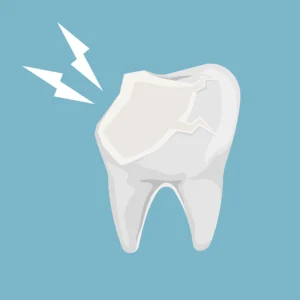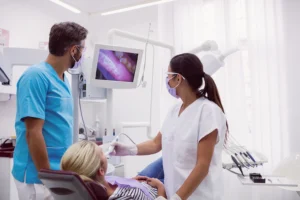Table of Contents
While we can adjust our clocks for daylight savings, we can’t turn back time when it comes to cavities and tooth decay. Studies reveal that one in five Americans has untreated cavities. But what are cavities? Cavities are small holes that form in a tooth when decay erodes the enamel, often leading to pain and more severe dental issues if left untreated. Cavities can affect people of all ages, from infants to adults, and factors like daily oral hygiene, diet, and genetics all play a role.
Dry mouth—a condition marked by low saliva production—is also a significant risk factor for cavities. Common in people who use tobacco, consume alcohol, take certain medications, or undergo radiation or chemotherapy, dry mouth often leads to bad breath and a higher likelihood of cavities.
How Cavities Form
Cavities develop when sugary or starchy foods fuel bacteria in plaque, a sticky film that coats your teeth. These bacteria produce acids that erode the enamel. Over time, this erosion can penetrate to the softer dentin layer beneath, putting the tooth’s pulp at risk. Cavities often form in hard-to-clean areas, like the grooves of molars, between teeth, and around the gumline.
Signs You May Have a Cavity
If you’re wondering whether you have a cavity, watch for these symptoms:
- Gum tenderness
- Tooth sensitivity to hot or cold
- Persistent tooth pain, especially at night
- Dark spots or small holes on your teeth
- Pain when biting down
- Soft spots on your teeth
How to Prevent Cavities
The good news is that cavities are largely preventable when you follow these simple steps:
- Limit Sugary Foods and Drinks: Minimize your intake of sweets, sodas, and other sugary items that feed plaque-causing bacteria.
- Brush Twice a Day: Use fluoride toothpaste to strengthen enamel and brush at least twice daily to keep plaque at bay.
- Floss Daily: Clean between your teeth to remove plaque and food particles that brushing alone can’t reach.
- Rinse with Mouthwash: Use an antibacterial mouthwash to reduce plaque and prevent tooth decay.
- Regular Cleanings at Hardin Family Dental: Schedule biannual checkups and professional cleanings with our team to maintain your oral health and catch any issues early.
If you’re prone to cavities, consider using fluoride-based products, or ask Hardin Family Dental about applying dental sealants for additional protection.
Treating Cavities Early
Detecting cavities early allows for easier, less invasive treatment. Small cavities can typically be repaired with a simple filling, while more extensive cavities may require root canal therapy, crowns, or in severe cases, dental implants or bridges. By catching cavities in the early stages, you can save yourself from pain and more costly treatments down the road.
Maintain a Cavity-Free Smile
The best way to protect your smile is by practicing good daily oral health habits—like brushing and flossing—and scheduling regular visits to Hardin Family Dental. If you suspect you have a cavity or want to focus on prevention, call Hardin Family Dental today to schedule an exam. We’re here to help you maintain a healthy, beautiful, and cavity-free smile!



